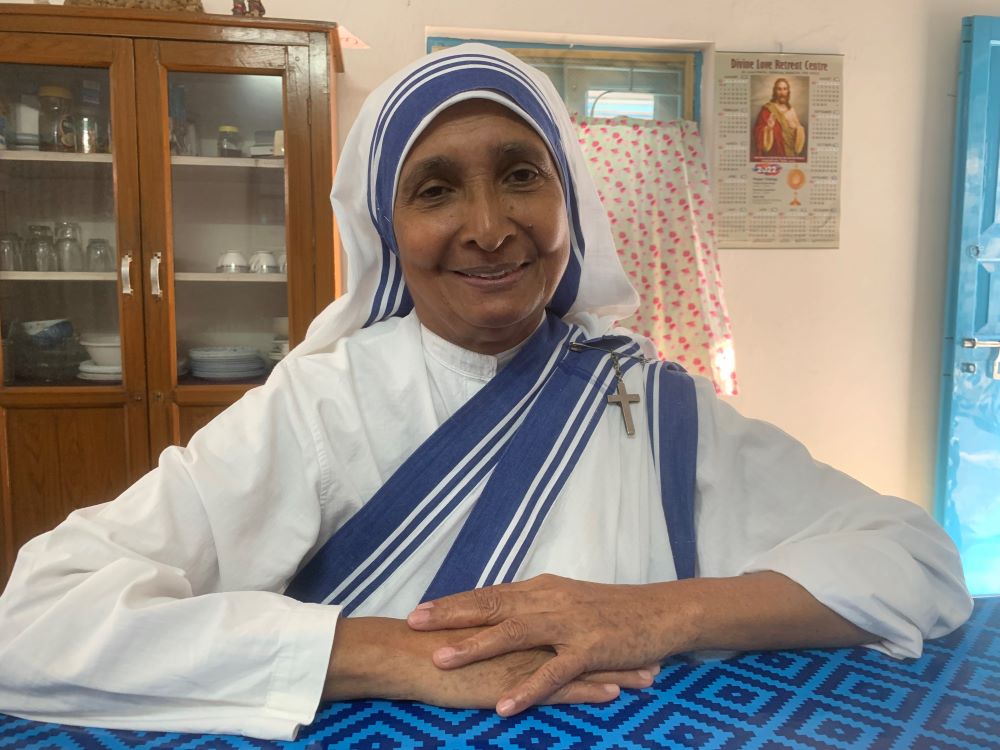
Sister Mary Joseph, the newly elected superior general of the Missionaries of Charity (Francis Sunil Rosario)
Editor's note: This Q&A was originally published on Matters India, a news portal that collaborates with Global Sisters Report and focuses on religious and social issues. The Q&A has been edited for GSR.
Sister Mary Joseph*, the newly elected superior general of the Missionaries of Charity, says her global congregation will continue its original mission of serving the poorest of the poor despite numerous hurdles. She is the first Indian to hold the office of superior general.
She also asserts that religious conversion is not their agenda, as some hard-liners in India allege.
Sister Joseph cannot speak for long periods of time because of vocal cord problems. However, she spoke with Matters India on April 2 about how she will lead the congregation founded by St. Teresa of Kolkata.
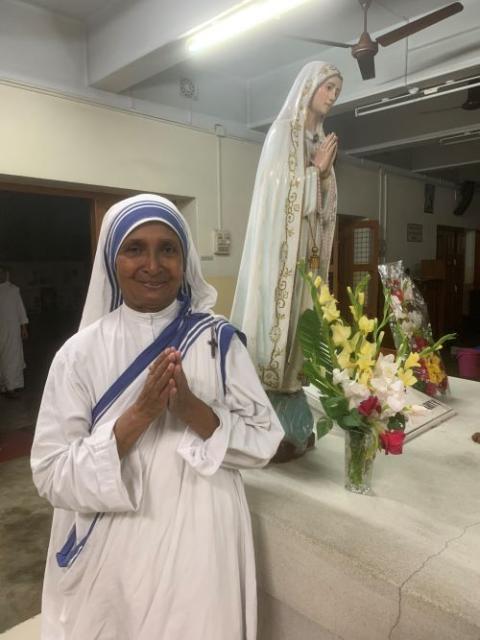
Sister Mary Joseph, the newly elected superior general of the Missionaries of Charity, near the tomb of St. Teresa of Kolkata, India (Francis Sunil Rosario)
GSR: Congratulations for being elected leader of your congregation. What are your thoughts?
Sister Joseph: I experienced fear and deep shock when my name was announced to take up the leadership. It was not easy to digest. I had never dreamed to lead the congregation one day. I felt I was not the one for the task. That night was a nightmare to me. However, I allowed God to speak to me in silence and prayer. In that dark night, I had the assurance of God that he was calling me to take up the position. It was not my choice, but his choice, at this particular time of history. Thus, I accepted the challenge.
What are your priorities?
My one single priority is to pray. Prayer is essential for us in the Missionaries of Charity. I learned the art of deep prayer from Mother Teresa. When she prayed, she was deeply united with Jesus on the cross — whether at daily Mass or adoration before the Blessed Sacrament.
Mother's simple prayer has always inspired me: "The fruit of silence is prayer, the fruit of prayer is faith, the fruit of faith is love, the fruit of love is service, the fruit of service is peace."
Growing in the life of prayer will help me and other sisters to take up the works of charity in given circumstances and context. Our life should reflect the life of the poor, the rejected and the dejected. That is our only priority.
You were the secretary of Mother Teresa and had worked with her very closely. How was that experience?
I was appointed novice mistress, and I stayed in our motherhouse [in Kolkata] for four years. I was very close to Mother during those years. I learned some of the nitty-gritty of her ways. Her simplicity, total integrity, honesty and her constant love for the poor, the most rejected and the marginalized I learned from Mother.
I was quite fortunate to be closely associated with Mother, who placed her trust in me. She asked me to help her to write letters in Malayalam, a language foreign to Mother, to candidates who were applying and waiting to hear from her. I did that very faithfully.
Mother Teresa of Kolkata, India, presents documents for a new house to a villager in 1994 in Mumbai, formerly Bombay. (CNS/Reuters/Luciano Mellace)
Could you recall some incidents from those years that have left an indelible impression on you?
An incident took place in Prague. Mother visited this beautiful city, the center of Infant Jesus devotion. Mother and a few of us went to the church. Seeing Mother in the church, many devotees came to meet her and take her blessings. It was in the early 1990s.
People also donated cash. I was responsible to let Mother know the amount of donation received that day. When everything was over, we returned to the convent at around 10:30 p.m. I was very tired and kept the bag of money in a cupboard and thought of counting the cash the next morning.
Mother asked about the bag. I said I had kept it safe in a cupboard and would count the money in the morning. Mother insisted I count the money before going to sleep. She said, "Those were the contributions, people's money. We have no right over it. They are given for the poor. We must use the money entirely for the needs of the poor."
Mother taught me how to remain transparent in dealing with money and gifts given by the people. That was a huge lesson that night.
Another incident was in the motherhouse during my first year as the novice mistress. On the eve of our feast day, the chapel was decorated with flowers. It was a bit lavish. Mother was not happy. She called me and said, "Please remove all those flowers and decorations from the altar. It's enough that you keep one flower on the altar. Jesus knows all that. The money spent on those beautiful flowers is meant for spending on the poor. We have no right over that money."
I did not understand the logic behind Mother's words that day. Later, I realized how concerned Mother was toward the needs of the poor. She was very particular about spending money carefully. Every single paisa belonged to the poor. I learned to value the spirit of poverty, detachment and the life of simplicity.
Once, Mother returned from Belgium at night, and all had gone to sleep. The bell rang in the middle of the night. Everyone got up to see what was happening. To everyone's surprise, Mother was standing there with chocolates that she wanted to put in the mouth of each of us.
Mother was truly a friend, philosopher and a spiritual guide. She taught me by her exemplary life of total surrender and dedication to the poor and the most rejected. She also had a sense of humor. She nurtured me spiritually and taught me to be human, also.
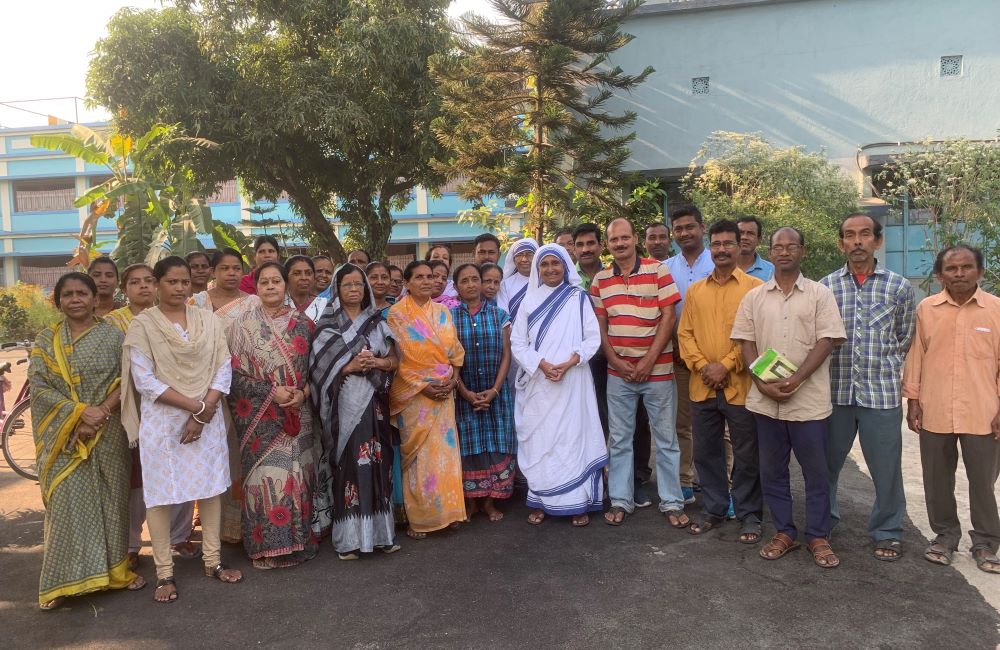
Sister Mary Joseph, new superior general of the Missionaries of Charity, stands with the workers and residents of Green Park Convent in Kolkata, India, where the congregation's general chapter was held in March. (Francis Sunil Rosario)
Your congregation faced some difficulties when the government delayed renewing your Foreign Contribution Regulation Act (FCRA) license. How did the congregation survive those days? Has the government fully restored that account?
It created some crises. However, it was a time for us to learn to keep government-related documents and report them as and when needed.
Thanks to all our people who have supported us during those days when the congregation had to live with meager funds. Some came forward to support our cause, to serve the poor and needy, like the states of Odisha and West Bengal. We cut down on our expenses. At times, we sacrificed our meals. It called for renunciation. It was the time to experience certain deprivations in life. We felt the agony of the poor during those trying times.
Thanks to the government of India, our FCRA has been renewed for five years. We are taught to be transparent and accountable in our dealings with money and its proper use.
Your congregation's handling of the media is also a problem. Some say the congregation prefers foreign press to the local Indian press. Will you be more open and accessible to the media?
Our congregation is not media savvy. We prefer to work silently without much publicity. Those who recognize our work as God's work try to know more about us, and they report the matters, sometimes, without our knowledge. We are not trained to handle media personnel and media channels.
I think in the future, some of our sisters should be trained to learn such skills to communicate our concerns and for the good of humanity, for the common good and good of the church, although that is not our main concern. Love for the poor and the downtrodden remains our top priority.
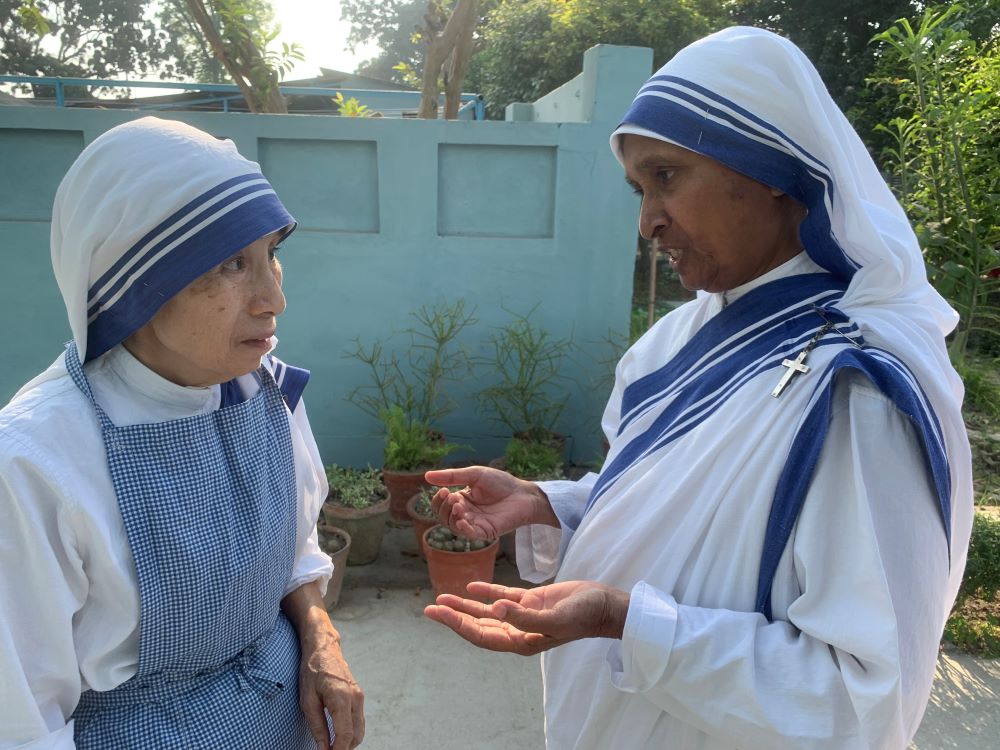
Sister Mary Joseph, right, newly elected superior general of the Missionaries of Charity, with Sister Mary Christie, a Japanese sister who was elected the assistant superior general (Francis Sunil Rosario)
There was a controversy during the time of Mother Teresa over charity and social justice. The Mother silenced her critics by saying something like, "Let others do social justice and let me help the poorest." Do you think the time has come for the congregation to rethink its charity mission and branch out into other apostolates?
We are not social workers. Our charism is to live for Jesus and for the poor. "When I was hungry, did you feed me? When I was thirsty, did you give me a drink of water?" This we do in charity. We utterly depend on God's providence. God takes care of us.
Anything that goes against our charism, we do not accept. Our priority is to practice charity in a real sense. Our apostolate is to give God's presence to the suffering humanity.
Through our works of charity, we are called to grow in the life of Jesus, to experience his paschal mystery. Jesus wants our lives to become transparent in our relationship with him. There is the need to interiorize our life in Jesus Christ. By our presence, we give witness to Jesus Christ.
At the moment, in war-torn Ukraine, four of our sisters are staying in the most difficult situation — Kyiv, where constant bombings are taking place. They were asked to move out to another safe place. They preferred to remain with those affected people to safeguard them. They live in a basement together with some people who had to leave their homes. Every day, numerous people come and ask if they could also stay for safety. Our sisters are providing them shelter, food and all the needs they have during wartime.
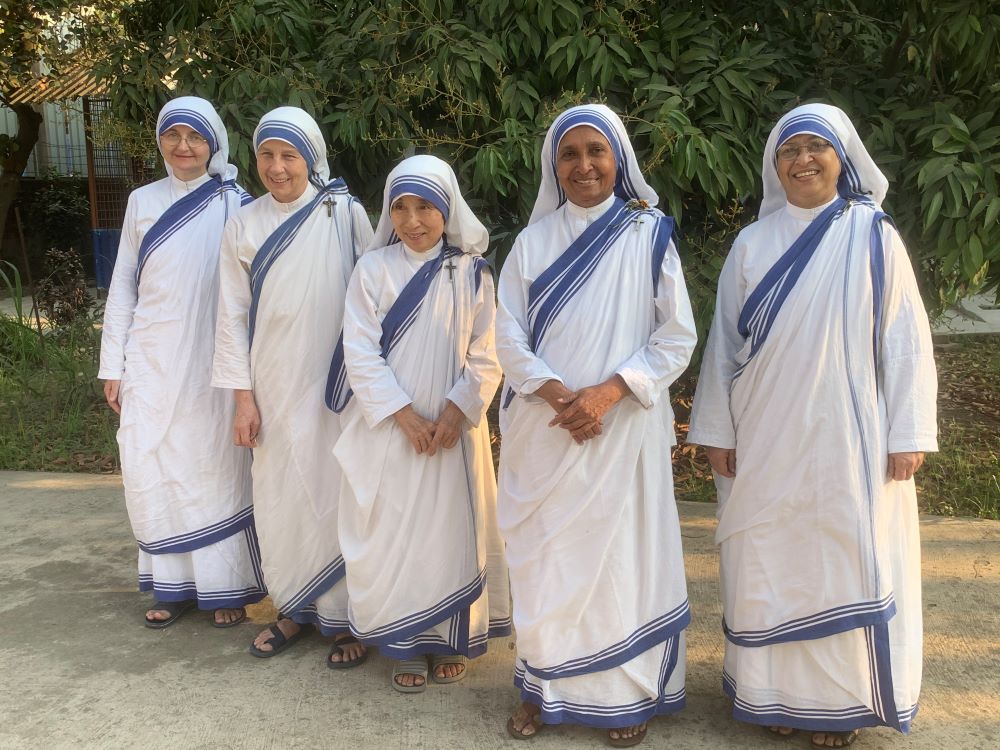
The members of the new general council of the Missionaries of Charity. From left: Sister Mary Cecile from Poland, second councilor; Sister Mary Patrick from Ireland, fourth councilor; Sister Mary Christie from Japan, first councilor and assistant superior general; Sister Mary Joseph from India, new superior general from Kerala; Sister Marie Juan from India, third councilor. The photo was taken March 19 at Green Park Convent in Kolkata, India, on the feast of St. Joseph, when the congregation's general chapter ended. (Francis Sunil Rosario)
On religious conversion, what have you to say? Why is the congregation unable to challenge such allegations?
Our charism allows us to serve the needs of the poor and the poorest of the poor. We stand by them to protect their rights, their dignity and their freedom to live in a dignified way. They have no one. We are their guardians to look after, irrespective of who they are or what background they come from. We put into practice our love of God and love of our neighbors who suffer injustices, deprivations, and become the victims of socioeconomic and political systems. We create a place for them where they feel safe, protected and secure.
Conversion is not our agenda in service of the poor and the underprivileged. Only God can convert, as Mother would hold. Different people perceive us differently. We respect their opinions and the way they look at us. We continue with our mission to serve the poor. For us, that is satiating the thirst of Jesus Christ in suffering humanity.
Advertisement
Please tell us something about your vocation. When did you decide to become a sister? Why did you choose to join this congregation? What about your family?
It was my desire to become a nun right from my school days. After completing my matriculation, at the age of 17, I ran to the Thrissur vocation center and met Sister Anand from Germany. She invited me to join the congregation. The words of Jesus — "I came to serve and not to be served" — motivated me to join the Missionaries of Charity.
The simplicity and spirit of poverty also attracted me. My inspiration was to serve the poorest of the poor wholeheartedly. I was deeply attracted by Jesus, his suffering for humanity and poverty.
My family was simple and ordinary, but they supported my choice in life. I lost my parents. My three sisters and a brother are all married and have families. None of them objected to my joining this religious congregation.
It was easier to say than to put into practice the life of poverty and simplicity. Through the years of living the charism of the Missionaries of Charity, I had to purify my intention to serve Jesus in the poor. In reality, we have to discover the cross of Christ daily.
*Global Sisters Report previously published the wrong name for Sister Joseph, for which we apologize.







